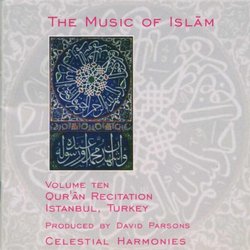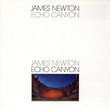| All Artists: Various Artists Title: Music of Islam 10: Qur'An Recitation Members Wishing: 0 Total Copies: 0 Label: Celestial Harmonies Release Date: 2/17/1998 Genres: International Music, Pop Styles: Middle East, Islamic Number of Discs: 1 SwapaCD Credits: 1 UPC: 013711315028 |
Search - Various Artists :: Music of Islam 10: Qur'An Recitation
 | Various Artists Music of Islam 10: Qur'An Recitation Genres: International Music, Pop
Ten years in the making, The Music of Islam series recorded in Egypt, Morocco, Tunisia, Turkey, Yemen, Pakistan, Indonesia, Iran and Qatar represents the most comprehensive sound documentation available to Westerners to... more » |
Larger Image |
CD DetailsSynopsis
Album Description Ten years in the making, The Music of Islam series recorded in Egypt, Morocco, Tunisia, Turkey, Yemen, Pakistan, Indonesia, Iran and Qatar represents the most comprehensive sound documentation available to Westerners today, of a world religion dating back to 1/622. Although governed by strict rules for fourteen centuries, contact with other cultures has radically affected Islamic music throughout history. As the world enters the XV/21st century the timing of this collection serves an even larger purpose, documenting the traditions that have survived and will continue to survive for centuries to come. Today, one fifth of the world's population, one billion people, are Muslims, occupying a large territory stretching from the Atlantic shore of north and west Africa, through west, central, and south Asia to island southeast Asia, and attracting an increasing following in India, western Europe, north America, east Asia, and southern Africa. This is a global presence which cannot be ignored.Many orthodox Muslims have traditionally held that music is generally detrimental to the listener's religious life, and as a result there is relatively little sacred music in Islam. But there is some. Central to Islamic life is the chanting of the holy scripture, the Qur'an. Two associated works, the call to prayer known as ezan (adhon) and the tekbir, are known throughout the Islamic world, and are also performed in a highly stylized, richly embroidered style of chant. These prayers are the subject of this volume. A further prayer, the mevlud (mawlid) and regional prayers for the month of Ramadan are reserved for special occasions. All of these sacred works are sung/recited (the distinction becomes almost a semantic one in these performances in Arabic, of course); but difference in pronunciation and inflection have led to distinctly regional styles of performance. The five reciters recorded in this volume are all based in Istanbul, Turkey, where the tradition of Qur'anic chant is particularly strong.The sound of the Qur'an recitation can be a striking one for Western ears. The modes can range from the slightly piquant to the startlingly exotic. But it bears repeating that, for all the musical interest in these performances, this is basically not music at all. It is prayer; and like the chanting of the Buddhist monks of Tibet, has as its ultimate aim not a musical goal but a spiritual one. Similar CDs
|
CD ReviewsGood work! Danny H. Hall | Michigan | 02/02/1999 (5 out of 5 stars) "While not actually 'music' per se, it has been called so by the Islamic reciters in this CD. This CD also provides a detailed history of the Qur'an and Islam in general and is very educational. Also, for musicians, provides some insight into the 24 divisions of an octive - good stuff to study for the musician that is interested in world music. I plan to buy more in this series..." Superbly spiritual Danny H. Hall | 03/21/2003 (5 out of 5 stars) "The opening Azan is what I heard live late one afternoon, walking out a door of the Suleimaniye Mosque in Istanbul into a magical nearly empty courtyard. This CD is in Turkish-style chant, and well worth buying. Strictly speaking, Koranic recitation is not music, but the recitation of Scripture in chant form. However, those who do not understand Arabic will still find themselves strangely and deeply moved to know more about Islam." Inspirational Danny H. Hall | 08/30/1999 (4 out of 5 stars) "The CD is an inspirational work that will capture the soul of Muslims and non-Muslims alike. However, beware: Track 5 is NOT the Sura Furqan, as promised in the accompanying booklet, but the Sura Mulk (LXVII)."
|

 Track Listings (13) - Disc #1
Track Listings (13) - Disc #1